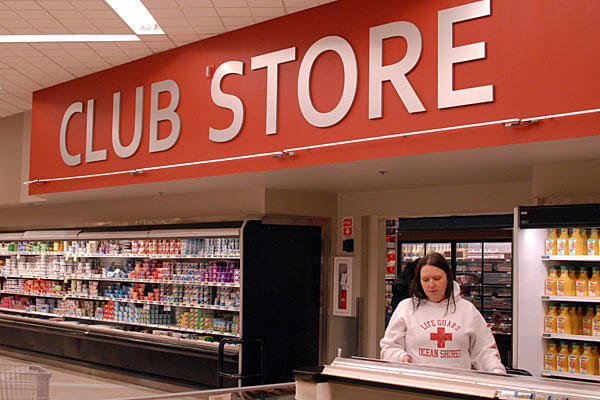JOINT BASE LEWIS-McCHORD, Wash. -- A new Defense Commissary Agency pilot program aims to lure shoppers who prefer buying in bulk into shopping exclusively at the commissary.
The program, being tested here at the McChord Field commissary, converted a section of the main store into a "commissary club" area. Premiered early this month, the area contains rows of cold storage with bulk packs of vegetables, dairy products and meat, as well as a large section of dry foods, hygiene items and paper products.
"When shoppers do their own price comparison to local club stores and take into account no membership fee and that they can use manufacturer coupons, they will find this to be a great savings," said Janice Coleman, the manager of the McChord Field commissary.
Most commissaries feature one to two aisles dedicated to "club pack" wholesale sizes. But DeCA is testing how customers will respond to a larger selection of bulk items at two locations.
At Navy Outlying Field Imperial Beach, Calif., the agency is using a "commissary plus" model and stocking the bulk versions of items next to their smaller counterparts in the traditional portions of the store. McChord Field is the only store that contains a separate "commissary club" section.
The club pilot program comes as DeCA faces a proposed $1 billion budget cut by 2017. The Defense Department plans to make up the shortfall by raising prices as much as 20 percent or increasing the surcharge. Any cost increase, as well as the proposed budget cut, must be approved by Congress.
In the past, commissaries have hosted biannual case lot sales, which featured bulk items brought in specifically for the event. However, those sales were canceled for both 2013 and 2014 because of budget cuts.
Commissary officials said halting those sales annually saves the agency $900,000 in personnel costs. The commissary club format could be used as an alternative to the case lot sales, said Bruce Dubisar, the commissary club project manager.
"The two club store formats could be an alternative to the annual case lot sales if they prove effective," he said. "Commissary club and commissary plus could provide DeCA with the opportunity to run case lot sales year round."
DeCA officials plan to run the bulk food pilot programs for 12 to 18 months to gauge customer response. Officials said they will base the decision to take the program to other stores off a combination of factors.
"First, we want to be able to provide our customers with a healthy savings on their club pack purchases," Dubisar said. "Second ... we will gauge customer acceptance on their purchasing behavior. An increase in club pack sales and an increase in total store sales will be indicators that this is a store format of value to our customers."
McChord's commissary was chosen as the pilot site because officials felt the area, with its high retiree population and large shopper volume at the two commissaries on Joint Base Lewis-McChord, made it a great test site, Dubisar said. Coleman said the McChord location was in the top 5 for club pack size sales worldwide before the expansion, making it an ideal place to expand the wholesale selection.
Prior to the club addition, the McChord commissary carried between 200 and 300 club packs at a time. When the commissary club area is fully stocked, it will contain about 700.
One challenge for the new area may be getting word out that it is even there. Coleman is relying on word of mouth and media attention to spread the news.
Despite being less than 10 miles away from each other, the McChord and Lewis commissaries are under different management and have what Coleman called a "friendly competition." She said they are unlikely to post fliers advertising the new McChord section at the Lewis side store, despite its close proximity.
Coleman said shoppers should be able to rely on items in the club section to be cheaper than those in the regular store. For example, whole Foster Farms chickens sold in pairs in the club section were $.99 per pound on March 25 while the same item sold individually in the regular store was $1.89 per pound. Yoplait yogurt was $.043 per ounce in the club section and $.073 per ounce for the same item in a smaller container in the regular store.
"It had pretty much everything I get with my Sam's Club membership," said Candace Hollen, a military spouse at JBLM who shops at McChord. "I love getting hygiene stuff, diapers, wipes, dog food, etc. in bulk."
Hollen said she hasn't done a detailed price comparison but finds the prices to be comparable to Sam's Club. Coleman, however, said a price comparison study between the commissary and wholesale stores like Sam's Club and Costco found DeCA prices to be between 20 and 25 percent less.
"I love it," said Jess Pagan, an Army spouse at JBLM. "We have a Sam's and Costco membership ... and I found the prices to be comparable [to or] cheaper than both of those stores. I'm hoping they get in a little more variety. I would love to see more bulk baking goods."
Commissary officials had a table set up just outside the club area taking suggestions on new items to carry. They said they plan to expand their choices based on what patrons are requesting.
-- Amy Bushatz can be reached at Amy.Bushatz@monster.com.




























